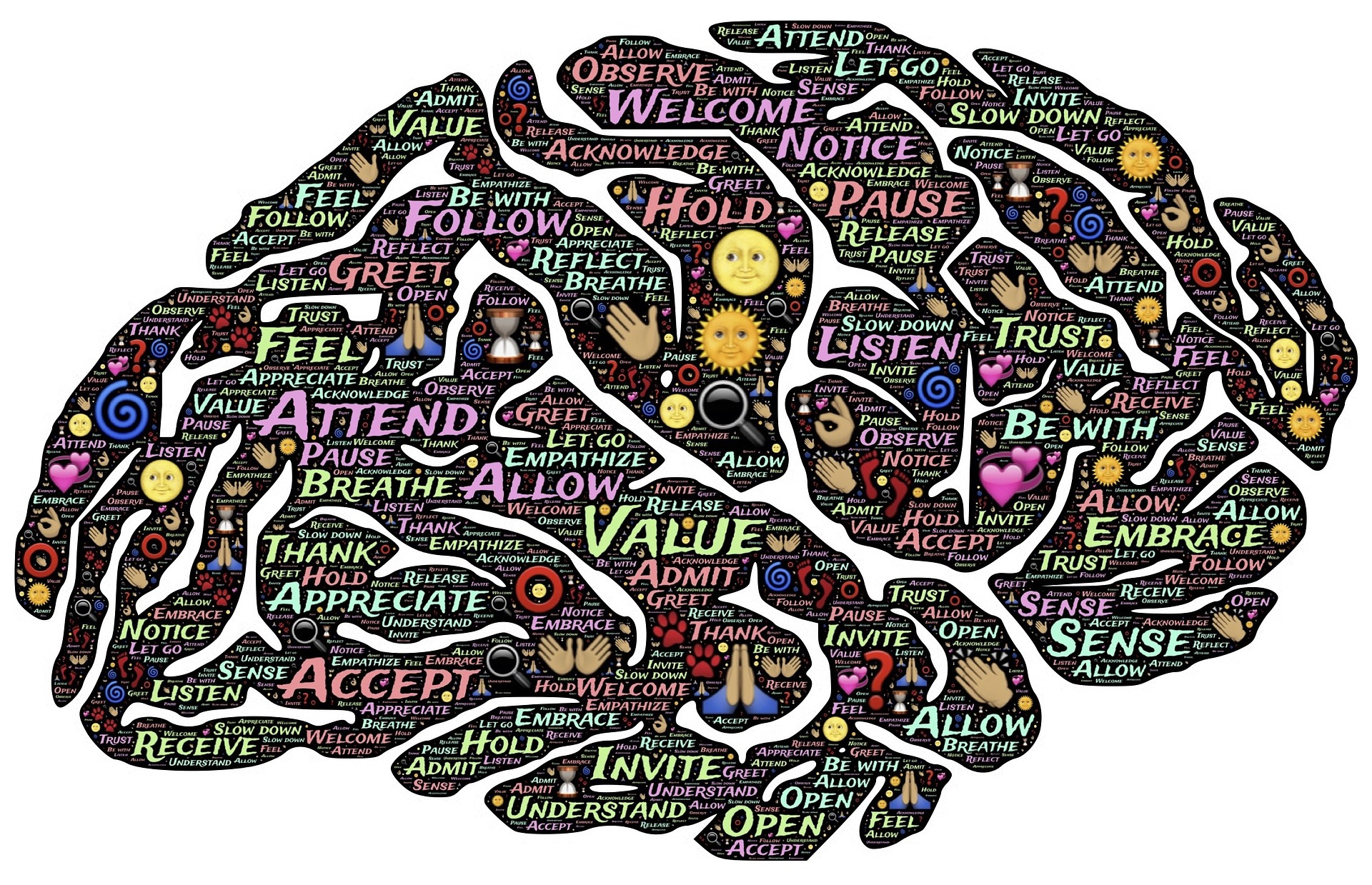Ancient wisdom and spiritual practices from every culture advocate compassion, or the expression of empathy towards others in their suffering; but for some of us, compassion doesn’t seem to come naturally. Whether it be a result of childhood neglect, domestic abuse, or some other heart-breaking event, many people shut down their ability to “feel” as a defense mechanism. By developing self-compassion, we can gradually restore peace and well-being within our own hearts, and open them up to feel for others, thus bringing profound meaning and purpose to our lives.
A key component of self-compassion is taming the critic within to recognize that we are both worthy and valuable, whether we meet our own expectations or not. There can be many faces to one’s hesitance to accept oneself “as-is,” but with some persistent practice in goodwill, we can reprogram our thinking to allow for our own unconditional loving kindness.
Common roadblocks for self-compassion
A number of negative emotions can be powerful enough to degrade one’s self-compassion. Guilt, anger, frustration and loathing can quickly undermine our positive thoughts if we don’t know how to keep them in check. Practicing mindfulness can help us recognize and acknowledge these emotions without being controlled by them.
One who feels guilt or regrets from the past may be morbidly afraid to act, for fear of being incorrect. Learning to separate the past from the present and accepting that everyone makes mistakes is an important part of moving towards a heart of compassion and the freedom to participate fully in life.
Anger, likewise, is rooted in the past. One may have suffered disappointment in others or felt the acute unfairness of life, but holding onto anger does nothing positive for the body or soul. Rather than letting anger eat away at the heart, it can instead be transformed into a vehicle for change.
Success
You are now signed up for our newsletter
Success
Check your email to complete sign up
Frustration often comes from a sense that one is unable to accomplish something they ought to be able to. This judgment is both harsh and unfair. Everyone has their strengths and weaknesses. Learning to accept that some things will be a challenge and developing the patience to work through difficulties are valuable tools on the road to self-compassion.
Sadness, brought on by a great loss or hopelessness, can be disabling. Learning to observe this feeling without dwelling on it is an important step in releasing yourself from it. Although we cannot control the emotion, we can control how we react to it. By accepting and letting go, we can move forward.

Taming the inner critic
Any or all of these emotions can cause one to be overly critical of oneself. Harsh criticism rarely has a good effect and often serves to support existing negative attitudes. Putting your inner critic in his place is crucial to self-compassion.
“People thrive on positive reinforcement. They can take only a certain amount of criticism and you may lose them altogether if you criticize them in a personal way… you can make a point without being personal. Don’t insult or belittle your people. Instead of getting more out of them you will get less”
– Bill Walsh, football coach
Remember that none of us is perfect. In fact, every single person has a few major flaws. If we all held that against each other we would get nowhere. Let go of the idea that “not perfect is not good enough.” Traditional beliefs hold that we come to the human world to cultivate upwards amidst delusion. If we were already flawless we would not belong to the human realm.
We all have an inner voice chattering away constantly. Whether that voice is supportive or discouraging, kind or cruel, makes all the difference in the world. By fostering a sense of self-acceptance, we can put an end to our own verbal and psychological abuse that prevents us from flourishing. Otherwise, our negative perceptions can become a self-fulfilling prophecy.
Clearing the way for self-compassion
By changing the way you process your emotions, you can experience them without being controlled by them. There are a number of approaches you can use to transform your thinking.
Be your own best friend. If you were destined to spend your entire life with one person, wouldn’t you try to stay on good terms? Treat yourself as someone who depends on your support and friendship, with understanding and patience. Write yourself a letter full of kindness. Hold your own hand for support, or give yourself a hug if you need it.
Tell yourself: “It is natural and right to be kind to myself. I am worthy and deserve compassion and empathy.”

Forgive yourself. There is no need to punish yourself for your mistakes. Be patient and forgiving as you would be with a child, as we are all continually in the process of learning. Remember that nobody is perfect, and that making mistakes is a natural and acceptable part of life through which we learn and grow.
Recognize what you could have done better and be prepared to apply it next time around. Then move on. Give yourself the freedom to feel joy again.
Tell yourself: “I forgive myself because I am human and nobody is perfect. I let go of regret and embrace challenges without fear of failure.”
Keep a growth mindset. Face difficulties as a challenge, rather than a frustrating obstacle. By embracing challenges, we can find opportunities and meaning in them rather than giving up and feeling defeated. Don’t compare and criticize yourself against others who might tackle the task more easily. Instead, look to them for inspiration and see how you can develop strengths like theirs for yourself.
Tell yourself: “Every mistake is an opportunity to grow and learn. I won’t let them discourage me.”
Practice mindfulness. Mindfulness is an active state that entails living in the moment and paying attention to, rather than avoiding, your emotional reactions to what is happening. Acknowledge those emotions without over-identifying with them. Once we can recognize our emotions and accept that they may express how we feel, but do not define who we are, we can take steps to move out of their control.
In response to mindful recognition of your feelings, be gentle and kind with yourself, rather than denying or judging your emotions. Allow for the release of your emotions in healthy ways, like crying, talking to a friend, or writing an expressive letter to yourself or someone you wish to communicate with, even if you never send it. Putting your feelings down on paper can have a remarkable releasing effect.
Try to be broadminded enough to imagine others’ feelings, especially in a conflict. This can greatly reduce the intensity of your own emotions.
Partake in common humanity: Remember that we are individuals within a broad community. Our lives are neither separate nor isolated from others. Feelings of loneliness, sadness, bitterness, and despair are universal. When we realize that we are not alone in these feelings, they become bonding material rather than reasons to withdraw from society to ruminate on them.
Reaching out to others to talk about our feelings establishes a sense of connectedness, helps us see things from another, larger perspective, and promotes the building of valuable support networks.
Tell yourself: “I’m not the first or the last to feel like this. Many others have felt this way before. It’s hard to bear alone but sharing can make it easier.”
Keep the proper perspective. You do not need outside validation. Do not let your self-worth be dependent on how others perceive you, or, worse yet, how you think others perceive you. Social pressures to look or behave a certain way can lead to a negative self-image, anger, and frustration. Practice self-reliance to separate yourself from those expectations and ultimate pitfalls.
Tell yourself: “I accept who I am, with all my faults and weaknesses. I am not bound by others’ judgements.”
Cultivate an attitude of gratitude. Rather than feeling discouraged about what is not right in your life, you can tally up the good things, or “count your blessings,” as the saying goes. This shift in focus can help one view the world as a friend, rather than a foe, and enable beauty and peace to enter our lives.
Gratitude can be expressed in a daily journal, felt in your heart during a walk in nature, written in a card or letter to a friend, or quietly observed in your mind. Take note of positive moments as they occur throughout the day, then recall and share them to keep them alive.
Tell yourself: I am grateful for all my strengths and for every opportunity life gives me to grow and improve.
Self-compassion is a journey which may take you through some dark and uncomfortable emotions. The key to moving forward is to be mindful and rational about your feelings without dwelling on them. Treat yourself as a friend, and nurture kindness by accepting that you are not perfect and letting go of remorse. By recognizing your own value amidst hardships, you will soon see that we all face similar struggles, and empathy will naturally emerge.













